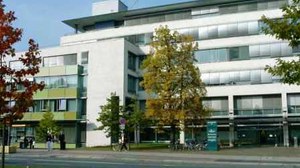Faculty of Arts, Humanities and Social Science
is characterised by a broad range of subjects from humanities and social sciences, offering multi-perspective, methodologically diverse and socially highly relevant teaching and research, which at the same time is internationally networked and firmly anchored in the social and cultural life of the Culture Capital Dresden.

Faculty of Arts, Humanities and Social Sciences
What all subjects at the Faculty of Arts, Humanities and Social Sciences have in common is that they describe, open up and understand the foundations of culture in its social change and against the background of its historical development in order to gain insights for practical application. This concerns society in general, religion, politics, art and culture, the media and private ways of life. In order to research social and political orders, urban, regional and global developments as well as cultural institutions such as museums and libraries, the Faculty of Arts, Humanities and Social Sciences offers explanatory knowledge and interpretations of human thought and behavior on an individual and societal level. This profile was the crystallization point for the Research Priority Area Culture and Societal Change - one of TU Dresden's five strategic profile lines.
The subjects at the Faculty of Arts, Humanities and Social Sciences are divided into eight, and since 2020 nine, Institutes of Philosophy, Catholic Theology, Protestant Theology, History, Art and Music, Political Science, Sociology, Communication Studies and Law .
With around 2000 students, the Faculty of Arts,Humanities and Social Sciencesis the largest faculty in the "School of Humanities and Social Sciences". In this area, it is united with its neighboring faculties "Linguistics, Literature and Cultural Studies" and "Educational Sciences" in order to cooperate in the fields of research, teaching and administration. The formation of the departments was an important measure in TU Dresden's success on its way to becoming a University of Excellence.
More than 20 degree programs and subjects are offered at the Faculty of Arts, Humanities and Social Science. From winter semester 2023/24, the new combined degree program"Arts, Humanities and Social Sciences" will allow students to study the subjects of the Faculty together and with second majors from the Faculty of Linguistics, Literature and Cultural Studies. In the Bachelor's degree programs, one core area and at least one additional supplementary area complement each other. The Master's degree programs impart in-depth and specialized subject-specific skills, which in turn are supplemented by components from other disciplines, including from other faculties.
In addition to the B.A. and M.A. degree programs, the faculty offers subject-specific training for teacher training programs in the subjects of History, Protestant and Catholic Religious Education, Philosophy/Ethics, Social Studies and Art. The subjects of the Faculty of Arts, Humanities and Social Science can also be combined with those of other faculties in these teacher training programs.
Through ERASMUS programs, students can study at the universities of Alicante, Amsterdam, Barcelona, Wroclaw, Bordeaux, Ghent, Izmir, Leiden, Milan, Murcia, Naples, Olomouc, Pamplona, Paris, Prague, Stockholm, Strasbourg, Turin and Zagreb, among others. There has been an exchange program with the "New School" University in New York for years. In most subjects, a joint doctorate with the École pratique des Hautes Études in Paris is possible. Sociology also offers a double degree with the University of Trento.
The course is also enriched by cooperation with institutions from the fields of culture, religion, society, politics and the media. For example, there is close cooperation in many areas with the Saxon State and University Library Dresden (SLUB), one of the largest academic libraries in Germany. Specialists from the world-famous Staatliche Kunstsammlungen Dresden (Dresden State Art Collections) support the teaching of art history as honorary professors. Various subjects cooperate in joint events with the German Hygiene Museum, political science with the Frauenkirche Foundation and Catholic theology with the Dresden Cathedral Forum. History cooperates closely with the Institute of History and Folklore of Saxony. The Faculty of Arts, Humanities and Social Science has personnel links with the Hannah Arendt Institute for Totalitarianism Research. The public lecture series of the Institute of Media and Communication with high-ranking journalists and politicians on topics of journalism and political communication regularly attract large numbers of participants. The Scientific Area Committee 4 "Culture and Societal Change" (SAC 4) coordinates cooperation between the School of Humanities and Social Sciences at TU Dresden and non-university research institutes in Dresden. It is a pillar of the DRESDEN-concept initiative, an important reason why TU Dresden has achieved the status of a University of Excellence.
The Faculty recently demonstrated its strong ability to conduct excellent interdisciplinary research by acquiring a Collaborative Research Center from 2017 to 2021 - together with colleagues from the neighboring Faculty of Linguistics, Literature and Cultural Studies. The Dresden Collaborative Research Center 1285 "Invectivity. Constellations and Dynamics of Disparagement" dealt with the forms, functions and consequences of disparaging, hurtful acts of communication and the role they play in the formation of social and cultural orders. Thirteen sub-projects from the Arts, Humanities and Social Sciences were involved.
This was the third Collaborative Research Center to be acquired at the Faculty of Arts, Humanities and Social Science (previously on the topics of "Institutionality and Historicity", "Transcendence and Public Spirit"). In addition, the Faculty of Arts, Humanities and Social Science was and is involved in various graduate colleges, some of which are international in scope. This currently concerns the Franco-German Doctoral College "Unterschiede denken/Construire les différences" (together with the École des Hautes Études en Sciences Sociales in Paris, Goethe University Frankfurt and the Humboldt University Berlin), which is funded by the Franco-German University.
Another core research area is the challenges of migration and integration for democratic societies and the forms, instruments and processes of their political processing. They form the focus of research in the Mercator Forum Migration and Democracy, which was founded in 2017 and has also set itself the goal of formulating instructions for action in the political arena.
Interdisciplinarity also characterizes the PhF's research beyond its own subjects and beyond the School of Humanities and Social Sciences. Since 2012, colleagues from the Faculty of Arts, Humanities and Social Science have been significantly involved in the development, management and successful implementation of the first, second and third Boysen TUD Research Training Groups. This brings together research perspectives and projects in which technical and natural science subjects cooperate with social and political science subjects. Currently, developments in the field of autonomous driving and electric vehicles are being investigated on the topic of "Changing mobility".
With four tenure-track professorships, the Faculty of Arts, Humanities and Social Science is involved in TU Dresden's success in the Federal and State governments' program to promote early-career researchers. This type of Chair offers academics a new, more reliable career path. At the same time, these Chairs serve to further develop the Faculty of Arts, Humanities and Social Science in terms of its research profile.
The individual Institutes of the Faculty of Arts, Humanities and Social Science have something special to offer in terms of research and teaching. For example, the Institute of Political Science has a teaching and core research areas in the field of international organizations. In art history, the focus is on the art of the late Middle Ages and early modern times as well as photography and film. An important core research area in philosophy is in the field of normative epistemology. Systematic areas of research in history include Saxon regional history, economic and social history, the history of technology and technological science and research into totalitarianism. Communication studies focuses primarily on changes in the media, journalism and the public sphere. In sociology, the focus is on cultural sociology with a focus on popular culture and intercultural comparative research. Protestant theology focuses on a cultural hermeneutic approach that examines the religious traditions of Christianity not only as a self-explication of the church, but also as a general cultural phenomenon. An association of lecturers from political science, sociology and communication science coordinates the teaching of methods in the Bachelor's degree programs in these subjects at the Center for Methods in the Social Sciences.

